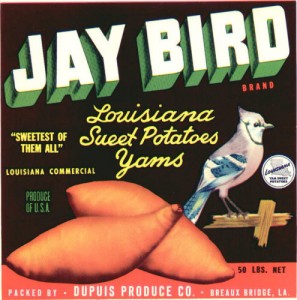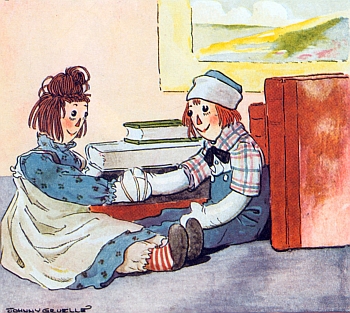- Reason TV interviews Richard Epstein;
- On the SEC’s big new “insider trading” sweep [Ribstein, Bainbridge, Lambert, Salmon, more Ribstein]
- Losing = winning? Ambitious claim for fees in environmental case [California Civil Justice, scroll]
- “Unintended consequences department: canceled flights” [Ted at PoL] And check out Ted’s new TSA Abuse Blog, on one of the hottest issues of the moment. More on that from Popehat and Simple Justice;
- H.R. 1408, the Inclusive Home Design Act, would compel handicap accessibility in private home design, yet another dreadful idea from Rep. Jan Schakowsky of CPSIA fame [AmendTheCPSIA]
- “This place would be a shoplifter’s paradise (and a liability insurance abuser’s motherlode) in the United States, but we were in Japan, where they don’t seem to worry as much about that kind of thing.” [Mark Frauenfelder, BoingBoing, on the Showa Kan museum of everyday midcentury life in Takayama]
- UK: “I moved out for decorators and squatters took over my house” [Evening Standard]
- From the ruins of Pompeii, a reflection on government and disaster relief [Dum Spiro Spero]
Posts Tagged ‘Jan Schakowsky’
October 25 roundup
- And she’s a psychology professor too: “Pro se litigant of the day” [ATL]
- “Access to justice” makes handy slogan, but has its limits re: appeal bonds [Ted at PoL]
- New Federalist Society white papers on Michigan, Illinois, California and Alabama supreme courts;
- Per her opponent this year, CPSIA proponent and perennial Overlawyered bete noire Jan Schakowsky ranks as most left-wing member of Congress [ExtremeJan.com]
- Naming opportunity at Faulkner U.’s Jones School of Law falls to Greg Jones of Beasley Allen [BA press release]
- Lockyer pushes divestment of firms for taking wrong stance on ballot controversy [Coyote]
- “Patent marking” suits continue to proliferate as Reps. Latta, Issa propose measures to curb opportunistic filings [Gray on Claims]
- “South Carolina tobacco fees: how to farm money” [ten years ago on Overlawyered]
CPSIA, business anger and the election
The Wall Street Journal had a report Tuesday on newly mobilized sentiment among businesspeople intent on challenging the rapid ongoing expansion of federal governance and regulation. It profiles Rick Woldenberg, well known to readers of this site as a tireless agitator against the insanities of the Consumer Product Safety Improvement Act  (CPSIA) of 2008. Woldenberg had been an Obama voter and basically apathetic about politics until the CPSIA debacle unfolded, putting at risk his medium-sized educational products company and many other makers and sellers of basically harmless products for kids. The indifference of the federal establishment to the resulting distress in the business community — and in particular the deaf ear turned by such lawmakers as Rep. Henry Waxman (D-Calif.) and Jan Schakowsky (D-Ill.) — propelled Woldenberg into legislative activism (AmendTheCPSIA.com) and then politics, where he has backed Joel Pollak in an unusually strong challenge to Rep. Schakowsky in her Chicago-area district.
(CPSIA) of 2008. Woldenberg had been an Obama voter and basically apathetic about politics until the CPSIA debacle unfolded, putting at risk his medium-sized educational products company and many other makers and sellers of basically harmless products for kids. The indifference of the federal establishment to the resulting distress in the business community — and in particular the deaf ear turned by such lawmakers as Rep. Henry Waxman (D-Calif.) and Jan Schakowsky (D-Ill.) — propelled Woldenberg into legislative activism (AmendTheCPSIA.com) and then politics, where he has backed Joel Pollak in an unusually strong challenge to Rep. Schakowsky in her Chicago-area district.
On CPSIA’s tendency to ban rocks used for study in Earth Science classes, see our earlier post. More: ShopFloor.
PUBLIC DOMAIN IMAGE from Elise Bake, Der Ball Der Tiere (“The Animals’ Ball”, German, 1891), courtesy ChildrensLibrary.org.
CPSIA: Russian nesting dolls, paper clips, science kits
The website of the Golden Cockerel import firm includes a rather elaborate warning as to why its matryoshka are not meant for the under-12 set, at least not since the enactment of the calamitous Jan-Schakowsky–backed law:
the law requires each batch of toys be tested by a 3rd party laboratory to be sure they are “toy safe.” Such tests can cost well over $1000 per nesting doll set! And sometimes, as with our museum quality one-of-a-kind dolls, a “batch” consists entirely of one doll, or only a few, making it totally unfeasible to test.
CPSIA: reserving treasured toys for strictly adult use since 2008.
More: The CPSC has just sided with purported consumer groups and against pleas from the business community in adopting a broad definition of what constitute “children’s products” under the disastrous Barbara-Boxer–backed law: for example, ordinary paper clips must go through costly separate CPSIA testing when meant for kids’ use as part of a science kit with magnets and similar items [NY Times, AP/WaPo (“Kids’ science kits may take hit from safety ruling”), Commissioners Anne Northup and Nancy Nord]
CPSIA for soap?
 “The Safe Cosmetics Act of 2010 (SCA 2010), now before the House of Representatives, is an inappropriate and seriously flawed attempt to make cosmetics safer.” Disregarding considerations of dose and concentration, the bill would require label disclosure of every substance present in an ingredient “at levels above technically feasible detection limits.” Essential oils and herb extracts typically contain 100 or more such substances, some of which, in isolation and at much larger concentrations, would qualify as toxic. And there’s a CPSIA-like requirement that manufacturers test all ingredients before sale. “Most small personal care product businesses will not survive if SCA 2010 passes.” [fragrance specialist Robert Tisserand] The lead sponsors of the proposed Safe Cosmetics Act of 2010 (H.R. 5786) are Reps. Jan Schakowsky, D-Ill. of CPSIA fame, Ed Markey, D-Mass., and Tammy Baldwin, D-Wisc. [Drug Store News] More: Lela Barker, Cosmetics Design.
“The Safe Cosmetics Act of 2010 (SCA 2010), now before the House of Representatives, is an inappropriate and seriously flawed attempt to make cosmetics safer.” Disregarding considerations of dose and concentration, the bill would require label disclosure of every substance present in an ingredient “at levels above technically feasible detection limits.” Essential oils and herb extracts typically contain 100 or more such substances, some of which, in isolation and at much larger concentrations, would qualify as toxic. And there’s a CPSIA-like requirement that manufacturers test all ingredients before sale. “Most small personal care product businesses will not survive if SCA 2010 passes.” [fragrance specialist Robert Tisserand] The lead sponsors of the proposed Safe Cosmetics Act of 2010 (H.R. 5786) are Reps. Jan Schakowsky, D-Ill. of CPSIA fame, Ed Markey, D-Mass., and Tammy Baldwin, D-Wisc. [Drug Store News] More: Lela Barker, Cosmetics Design.
“Schakowsky to run again for House, not Senate”
Maybe CPSIA didn’t play so well in downstate Illinois. [Examiner]
HR 875 and local food: is Rep. DeLauro backtracking?
[Third in a series on the possible effects of proposed federal food safety legislation on small/local foodmakers and farmers. Earlier coverage is here and here; and see related post on animal-tracking proposals]
- Could the outcry be having an effect? Until now, Rep. Rosa DeLauro (D-Ct.) has repeatedly insisted that backyard and kitchen-table producers have nothing to fear from her bill, H.R. 875, the proposed Food Safety Modernization Act, because they do not engage in “interstate commerce”.
 Many observers pointed out that under U.S. Supreme Court precedent, an exceedingly broad range of agricultural and food activity (right down to the growing of grain with which to feed oneself or one’s animals) has counted as within the bounds of “interstate commerce” reachable by federal regulation.* Now, at the end of a Huffington Post piece sympathetically relaying DeLauro’s views, there comes an “Update” nodding toward the courts’ practical application of the “interstate commerce” concept and reporting that DeLauro’s staff is promising “clarifications” of the bill’s reach, perhaps even “technical corrections”, to be ready “in the next few weeks”.
Many observers pointed out that under U.S. Supreme Court precedent, an exceedingly broad range of agricultural and food activity (right down to the growing of grain with which to feed oneself or one’s animals) has counted as within the bounds of “interstate commerce” reachable by federal regulation.* Now, at the end of a Huffington Post piece sympathetically relaying DeLauro’s views, there comes an “Update” nodding toward the courts’ practical application of the “interstate commerce” concept and reporting that DeLauro’s staff is promising “clarifications” of the bill’s reach, perhaps even “technical corrections”, to be ready “in the next few weeks”. - When those corrections and clarifications appear, one crucial question will be whether they include any de minimis provisions exempting small, local, or informal producers and sellers (of course, these entities might continue to face stringent state or local regulation). As it stands now FSMA, like CPSIA before it, is notable for its lack of de minimis exclusions, as well as its failure to prescribe “scale-appropriate” principles (“tiering”, streamlined reporting, etc.) by which entities that deal in less than industrial volumes might be given the benefit of simpler and less onerous rules.
- Given the stated views of the advocacy groups behind FSMA, I very much doubt that a revised version will in fact exempt producers of food intended for consumption within one state only. Even if it does, however, the law will still cover many persons like Harold Gundersen, who sells food from his Southwest Michigan farm at two suburban-Chicago farmer’s markets and in doing so manages to have legal contact with three states in all:
“We’re highly regulated by state government and federal government,” he said. … [Gundersen] pays $65 twice a year to an inspector from DuPage County, who comes up to Michigan to inspect the apple butter and cider that he sells.
Gundersen is indignant at that last requirement because he doesn’t even process the apple butter and apple cider — he takes his apples down to an Amish man in Indiana who seals them in cans and jugs. Because that facility is already visited by Indiana inspectors, Gundersen sees no reason for a DuPage inspector to take a second look.
“There is nothing for her to look at,” Gundersen said. “She looks at my jars and says, ‘OK, I’ll sign this stuff.'”
Through much of the country — in most of the big cities of the Northeast and Midwest, for example — food grown within a radius of (say) 100 miles will often have crossed state lines.
- FactCheck’s lullaby of reassurance on the subject contains the following passage aimed at readers who might be perceiving FSMA as a far-reaching power grab by the federal government, or something like that:
The bill has 41 cosponsors** and has been endorsed by major food and consumer safety organizations, including the Center for Science in the Public Interest, Consumer Federation of America, Consumers Union, Food & Water Watch, and The Pew Charitable Trusts. Food & Water Watch is a nonprofit organization that advocates for clean water and safe food and is headed by a woman who used to work for Public Citizen, the consumer group founded by Ralph Nader.
 Well! If a bill has 41 cosponsors, it must have been well vetted, right? (CPSIA had 106). And its backers include not only Consumers Union and Consumer Federation of America — both instrumental in bringing us the CPSIA debacle — but also a group headed by an alum of Nader-founded Public Citizen. It’s not as if Public Citizen was the acknowledged leader of the Washington coalition that pushed for CPSIA and has defended it ever since, right? Oh wait.
Well! If a bill has 41 cosponsors, it must have been well vetted, right? (CPSIA had 106). And its backers include not only Consumers Union and Consumer Federation of America — both instrumental in bringing us the CPSIA debacle — but also a group headed by an alum of Nader-founded Public Citizen. It’s not as if Public Citizen was the acknowledged leader of the Washington coalition that pushed for CPSIA and has defended it ever since, right? Oh wait.Center for Science in the Public Interest? That’s the outfit that’s called for federal regulation of the use of salt in foods, and its busybody litigiousness has long furnished copious material for this site. Pew Charitable Trusts (is it now OK for charitable foundations to support legislation?) has long had its hand in a hundred activist causes. And so forth. This is not reassurance; to coin a phrase, it’s de-assurance.
- Deputy Headmistress: “I would believe these consequences were ‘unintended’ if I didn’t see the same consequences from government action over and over again.”
- No, I don’t agree with the chain-email theories that insist that Monsanto, the giant agribusiness firm, is masterminding the push for this law. (Or the counter-push against it, depending on who you talk to. Maybe both!). Since the company’s name is always coming up, however, here’s a link to what the company’s own spokesman had to say on the lefty site Crooks and Liars, which was not quite what I expected (though I’m not sure what I did expect).
- Brian Doherty writes about the furor at Reason (with comments here) and John Schwenkler also weighs in at his blog. And in the comments section of our initial post, check out what “Pelly” has to say about yogurt in Nova Scotia.
*Of course, it’s possible that a statute might not grant the federal regulator as much authority as courts would be willing to uphold as constitutional. HR 875 incorporates by reference the FDA’s current definition of “interstate commerce”. I’m not an expert in this area, but various documents suggest that the FDA already asserts much authority over items and processes whose production or use does not cross state lines.
**Among the 41 co-sponsors are such figures as Rep. Jan Schakowsky (D-Ill.), who as a co-sponsor and defender of CPSIA has been ferociously unsympathetic to distress cries from small businesses arising from that law.
CPSIA: getting Washington’s attention

Given that nearly every member of Congress voted for CPSIA last year, it’s not surprising that that body of lawmakers was slow to respond to reports of the law’s catastrophic consequences. It’s beginning to happen now, though. Republicans have been in the lead, the latest sign being a strong letter from ranking House Commerce minority members Reps. George Radanovich (R-Calif.) and Joe Barton (R-Calif.) asking for a hearing. The motorcycle/powersports issue has also kindled widespread interest from Hill members (example: Rep. Michael Simpson, R-Idaho).
On March 4 there was a welcome break in the ice on the Democratic side as well. Rep. John Dingell (D-Mich.) sent a letter to the commissioners of the CPSC that, although cautiously worded, acknowledges many of the reports of calamitous consequences from around the country, something that his colleagues Rep. Henry Waxman (D-Calif.), Rep. Bobby Rush (D-Ill.) and Rep. Jan Schakowsky (D-Ill.) have been unwilling to do (when not dismissing those reports as based on misinformed or uninformed rumor). Of course, there is famously no love lost between Dingell and Waxman, who ousted him as Commerce chair. But Dingell’s stand could give cover for other Democrats to join in heeding the public outcry as legitimate. That letter in turn has prompted many CPSIA critics to write Dingell letters in hopes of arming him with more facts and arguments on the law’s ill effects: see in particular Rick Woldenberg and Wacky Hermit.
Waxman, for his part, has announced his intent to hold no hearing on the law until the Obama Administration installs a new chair at the Consumer Product Safety Commission. That serves the multiple functions of 1) stalling (while more small enterprises are driven out of business and thus are neutralized as political threats); 2) reinforcing the impression that the ball is in someone else’s court on addressing the law’s harms; 3) assisting in orchestrating whatever hearing is eventually held, since he expects an ally of his own to be installed as CPSC chair (the ultimate nightmare for CPSIA critics in that job would be someone like Pamela Gilbert, the class action lawyer, former plaintiff’s-lawyer lobbyist, and longtime Litigation Lobby figure who ran the Obama transition effort for the agency).
The membership of the House Energy and Commerce Committee, by the way, is listed here (hit “membership”; scroll to “Subcommittee on Commerce, Trade, and Consumer Protection” to find the members most directly involved). The membership of the Senate Commerce Committee is listed here and that of the Subcommittee on Consumer Protection, Product Safety and Insurance here.
Some miscellaneous weekend reading about the law: John Markley, Bureaucrash; Michael Maletic (Weil Gotshal & Manges), Republican National Lawyers Association; Ed Driscoll, Pajamas Media.
Public domain graphic: Grandma’s Graphics, Ruth Mary Hallock.
CPSIA chronicles, February 27

- Finally! Today’s Boston Globe covers the thrift-store calamity:
In recent weeks, Goodwill pulled all children’s merchandise from its nine stores in the state. Thrift chain Second Time Around eliminated kids’ clothing from several of its 16 shops. St Vincent de Paul is currently removing children’s clothing with metal zippers, buttons, and painted fabrics from its processing center, which sends out merchandise to its six stores in Massachusetts.
It’s exactly the sort of coverage that’s been overdue in the biggest newspapers since Feb. 10: well-reported, making clear the human costs of the law for both cash-strapped shoppers and charitable sponsors, and including words like “devastating” and “heartbreaking”. And on page one.
- If you missed it yesterday, Overlawyered gets results! Although sometimes the opposite of the kind we intend. Yesterday we hailed as a breakthrough the House Small Business Committee’s willingness to hold a hearing next week on the costs of CPSIA. Within a few hours, as Rick Woldenberg relates, Congressional staffers hastily put out word that they were canceling the hearing and that the idea is “not likely to ever be brought back”. There’s no way for us to know just who placed the phone call, but odds are good it was someone who realized that letting people from around the country get in front of a microphone and talk about this law’s effects would not exactly do wonders for the image of Henry Waxman, Bobby Rush, Jan Schakowsky, Public Citizen, PIRG, or their allies. More on the cancellation from Rick Woldenberg, who reports that this is the third time he’s been disinvited from Capitol Hill testimony. Sounds like someone really dislikes the message he would deliver.
- Hair bow makers on the verge of a nervous breakdown.
- The Examiner, which has a wide readership in Washington, D.C., San Francisco, and other cities, is out today with a great editorial on CPSIA which also generously directs readers to this site and its “chilling” reports. It concludes: “This law is an utter disaster. Congress ought to fix it, immediately.” The Examiner also quotes Sen. Mark Pryor (D-Ark.), one of the law’s sponsors, as saying “the law allows the CPSC to make ‘commonsense exceptions’ to anti-lead requirements.” This is not the first time I have been obliged to wonder whether Sen. Pryor actually has a close familiarity with the terms of the bill he helped guide to passage, and if not, whose summaries he has been relying on when he talks to the press.

It is precisely because the law does not confer on the CPSC any “commonsense exception” authority that the commission was obliged to turn down the makers of kids’ minibikes in their plea for an exemption the other day. Same for many other instances that could be cited, such as the pre-1985 books and the size 10 winter coats with zippers and snaps that are being yanked from thrift store shelves. Had the commission such a “commonsense exception” discretion, it would almost certainly have acted by now to defuse these sources of public outcry. To repeat the question: who does Sen. Pryor rely on for his briefings? - Speaking of products with vanishingly low risk of poisoning that have trouble obtaining commonsense exemptions, we’ve been remiss in not staying on the case of ballpoint pens, mentioned in our Feb. 6 and Feb. 13 roundups. Deputy Headmistress has quite a bit more on the legal limbo occupied by the writing implements, which appear now to be unlawful when intended primarily for under-12 use. And visitor “Scott” wrote last week in our comments section:
What still amazes me is that the story about ballpoint pens being in violation of the CPSIA isn’t getting more notice. The CPSC admits that ballpoint pens intended for children are covered. As it happens, the US trade association for the makers of pens, pencils and erasers has sent a letter to the CPSC that ballpoint pens are not-compliant and no existing alloy satisfies the lead limits. It may take 2 years to develop an alloy, if one exists. I can only conclude that there must be very very very many stores not in compliance and ‘poisoning’ our children with lead. Are these stores not facing strict liability and risking felony criminal liability including 5 years in prison and $250,000 fines? The stay by the CPSC doesn’t help the pen-makers or sellers, because they’re in knowing violation of the lead limits. All they can hope for is that none of the 50 state attorney generals decides to prosecute what would appear to be a slam-dunk case. There is a chance that the CPSC may eventually decide to make an exemption for pens, however the CPSC admits that its staff is ‘not yet aware of any substance as to which the required showing [of no absorption of any lead into the human body] can be made.’.


CPSIA chronicles, February 26

- UPDATE 5:45 p.m. Eastern: Well, that was quick. A source reports that Congressional staffers hastily announced that they’re canceling the hearing next week and that the idea is “not likely to ever be brought back”. Someone must have realized that letting people from around the country get in front of a microphone and talk about the effects of this law would not exactly do wonders for the image of Henry Waxman, Public Citizen, PIRG, or Consumer Federation of America. More: Rick Woldenberg confirms cancellation/disinvitation.
- A prime objective for critics of the Consumer Product Safety Improvement Act in recent weeks has been to obtain a hearing on Capitol Hill that might focus lawmaker and press attention on the law’s many unexpected and harmful effects. Now it looks as if that might be happening. Rick Woldenberg:
I have been invited to testify before the Subcommittee on Regulations and Healthcare of the House Committee on Small Business next Thursday. The purpose of this hearing is to explore Small Business issues related to the CPSIA. The Subcommittee is still looking for small businesses to testify. … If you are motivated to testify, you may want to reach out to the Subcommittee staff to volunteer, or if you have a Congressman on the Subcommittee, contact their Washington office urgently. …
- Relatedly, Whimsical Walney, whose time seems to have been in part freed up for blogging by the CPSIA-induced shutdown of her Bay-Area-based children’s line, offers some advice here and here on how to talk with lawmakers about the act.
- If you still haven’t taken a look at it, Daniel Kalder’s excellent BooksBlog entry in The Guardian (U.K.) on CPSIA and older books, which quotes from my City Journal article, is here. It’s drawn attention around the world, including places like France, Italy, and Romania.
- Speaking of books, America’s libraries appear to have dodged catastrophe for now with the help of the American Library Association’s (understandable under the circs) last-minute embrace of the position that unless someone announces otherwise, it’s going to assume the law doesn’t apply to library stacks or circulation (earlier; commentary on the shift, Deputy Headmistress and Rick Woldenberg). Thus: Cincinnati Enquirer (“We’re hopeful saner heads will prevail and they’ll exempt us,” says Emily Sheketoff of the ALA), Middletown (Ohio) Journal, Brown County, Ohio, News-Democrat.
So it seems to be mostly the librarians who are the most literal-minded and obedient about following guidance from high government authorities, or who are most legally risk-averse, or something, who are taking drastic steps like tarping over their pre-1985 stacks or planning to discard the volumes entirely or excluding older kids’ books from their used-book sales (in which case they’ll wind up….where?). Esther at Reading Loft/Design Loft has been picturing how libraries will look if they can’t make an exemption stick. And I didn’t notice it when it ran last month, but Annoyed Librarian had a funny rant at Library Journal about the law. Perish the thought, of course, that any library might ever want to acquire a pre-1985 book for kids’ use. - Popular conservative talk host Hugh Hewitt has continued his coverage of the law. Per one transcript, he discussed it with star columnist Mark Steyn who knew about the youth motorsports debacle:
In my little corner of New Hampshire, every 12-year old boy loves taking an ATV, loves riding it around up in the hills. And the idea that the lead in it is going to cause that kid to keel over, is preposterous. This is government by insanity…
On the other hand, Mark Riffey passes along word that popular talker Glenn Beck doesn’t plan to cover the issue because “there’s no public outcry” (a paraphrase second-hand of what might be a staffer’s view, or his, it’s not clear). What? Does he restrict his reading diet to the New York Times?
- Wacky Hermit at Organic Baby Farm is angry: “When you have to consult a lawyer before you hold a church benefit sale, you are not in America.” (some rude language).
- In the first-linked item above, Woldenberg also reports on an announcement by the Consumer Product Safety Commission’s chief of enforcement, Gib Mullan, that the commission intends to shift its enforcement methods in a more punitive direction, handing out many more penalties than previously in order to achieve more deterrent effects on businesses of all sizes. This is well in line with the clear guidance the commission has been given by Henry Waxman and colleagues in Congress. Next Thursday, if those planning the hearing do their jobs right, many in Congress might for the first time hear some voices that no one thought to consult when the law hurtled toward passage last summer. [REPEATING THE UPDATE: Hearing reportedly canceled.]

Public domain images: Grandma’s Graphics, Mabel Betsy Hill and Elson’s Basic Readers.
